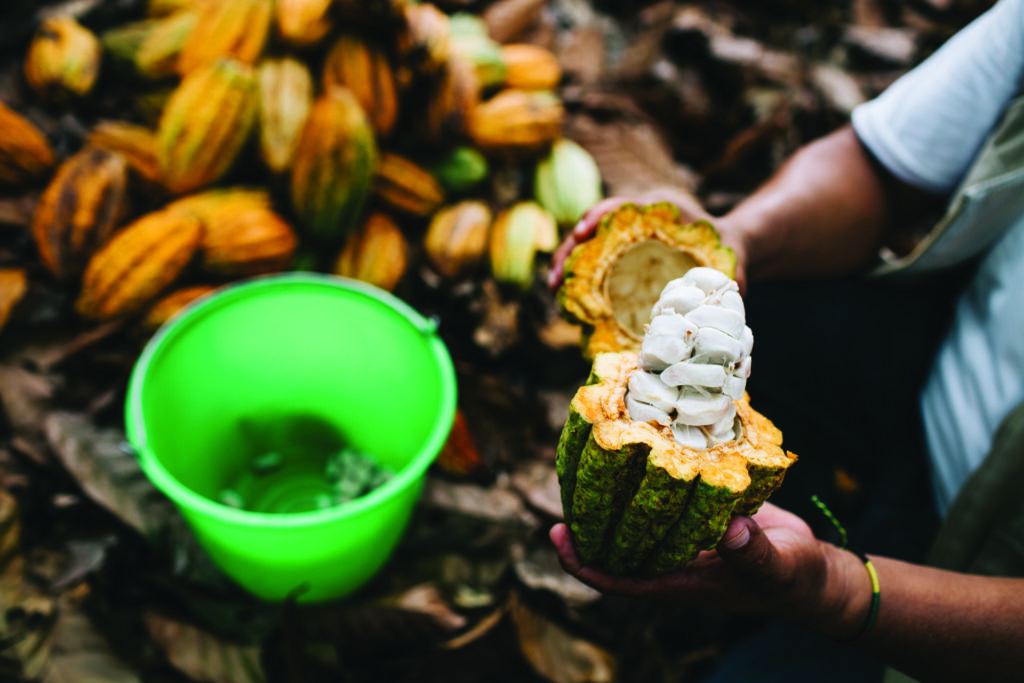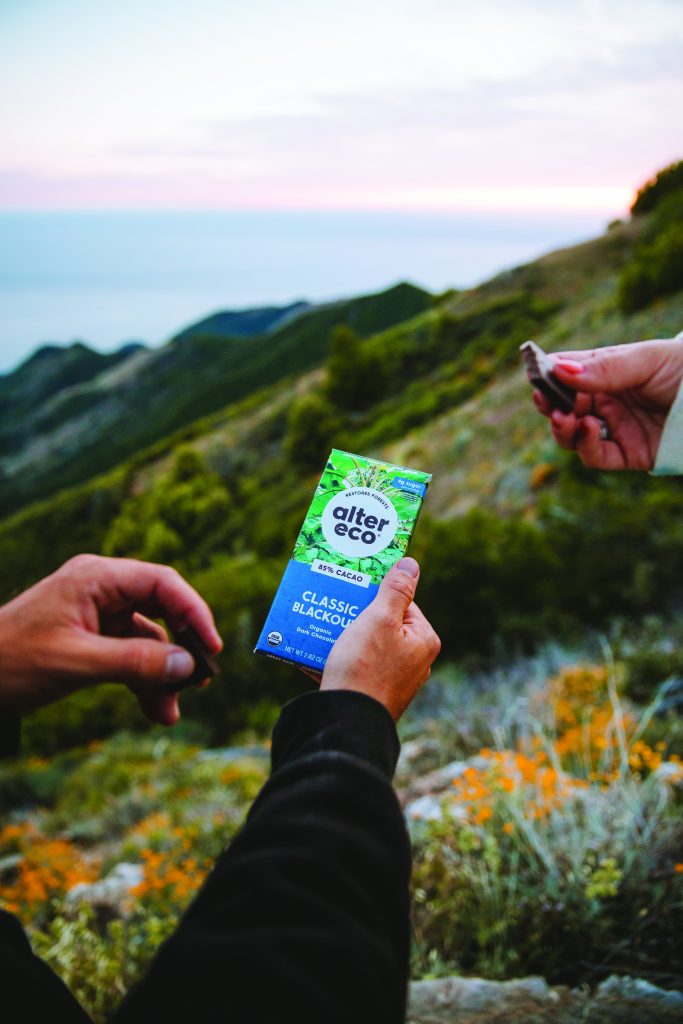Defying Chocolate’s Dark Side: Alter Eco Foods
Read Time
6 min read
Posted on
October 7, 2025

There’s a better way to bring consumers their cocoa fix — and it can be profitable.
Consuming chocolate is an ancient ritual long savored as a delectable treat — but it has a dark side. A majority of the world’s cocoa beans are grown in West Africa due to optimal growing conditions, where there’s a disturbing history of illegal deforestation and child labor that continues today.
Companies like Alter Eco Foods defy these practices, offering a better alternative. Founded in 2004, the public benefit corporation’s core principles are restoring ecosystems, improving livelihoods, and reducing waste. Alter Eco’s name refers to finding an alternative ecosystem for delivering food. Its chocolate, quinoa, and granola are grown in thriving environments by small-scale, fair trade farmers; made with clean, organic ingredients; and packaged using recyclable or compostable materials.
Not only did Alter Eco become B Corp certified in 2009, but it also became Climate Neutral certified in 2010, offsetting 100% of its carbon emissions by planting and protecting trees in Central and South America in partnership with PUR. In 2013 Alter Eco launched the first commercially compostable candy wrapper in its chocolate truffle product line; and in 2016 it came out with the first commercially compostable pouch for its quinoa line. In 2020 it started the Alter Eco Foundation to further its commitment to combat climate change and inequality through regenerative agriculture. As opposed to industrial farming, regenerative agriculture nourishes soil, secures farmers’ livelihood with a variety of crops, creates shade that improves working conditions, and builds resilience to climate change.
“We believe helping farmers embrace regenerative agriculture and agroforestry will be one of our biggest successes for years to come, as these changes not only provide the tools for these farmers and their families to be successful but help to restore the planet a little at a time,” Alter Eco CEO Keith Bearden tells Real Leaders.
Some Bitter, Some Sweet

While dark chocolate bars are the company’s mainstay, it has put out some less successful items that it later discontinued, including grass-fed milk chocolate, coffee, and rice products. “It was really finding the products where we could differentiate ourselves,” Bearden says. As for a recent win, in 2022 the company launched a no-sugar-added granola line. “We were looking for something to get into different categories. We found that we could source oats quite readily from regenerative farms. We were able to fit it into our brand DNA.” To differentiate its granola in a somewhat saturated market, Alter Eco identified another issue with consumers today — sugar — so it sweetens its granola with date powder and monk fruit. “The market has been very supportive of us. This category has quickly become almost 20% of our sales.”
The company’s greatest hurdle has been churning a profit. “Staying true to the mission has never been a challenge for the team; however having a sustainable and profitable company has been a challenge. Many companies that try to practice conscious capitalism struggle with how to support those in their supply chain while delivering a quality product and at that same time making money to continue to invest and grow the business. I’m proud to say we have somewhat mastered this formula over the past few years, and this has given us the opportunity to continue to invest and grow the business.”
How did they do it? “It’s a matter of starting out with understanding that no business, no matter how impactful you may be — to the climate, or to fair trade and wages, or to sustainable farming — if you don’t make money at the end of the day, unless you’re a nongovernmental organization, then you only can exist for a finite period of time. So when I got involved with Alter Eco, it was a classic natural product company founded with all the right principles, and everybody wanted to do the best that they could in the world, but they were losing money — and losing a lot of it.”
Bearden joined Alter Eco’s board in 2021 and became CEO in 2023, partnering with Trek One Capital to lead the acquisition of the company from a private equity group. “Unless they found a buyer, the company was on the verge of going away,” Bearden says. “They asked me to step in as CEO and help turn the company around.”
Remarkably he says it only took him three months to do just that. He shares his key moves: “I’ve done a number of turnarounds, and being on the board for a few years, I knew what levers to pull. I had this formula already laid out. You’ve got to find that balance of how can I make money but still stay true to the things that are our core principles as a company? The changes I made were really focused on looking at operational efficiencies to make the company profitable. So we made changes in logistics, staffing, and supply chain. We moved our warehouse. It was risky, but it saved over a million dollars. We discontinued products that weren’t performing well. We focused on products that were performing well. We went to market and managed our trade spend. We did a number of different things, but we’ve had a significant change in the position of the company financially to the point that now we are profitable and sustainable for the long haul. We’re up 16% in sales in 2024 from 2023, and 2023 was flat to the year before that.”
With those major changes behind him, Bearden sees his biggest risk today as ingredients’ price fluctuations — mainly cocoa beans. The cost of organic, fair trade cocoa beans tripled from January to April 2024. “The only advantage there is that the entire world is playing by the same rules,” Bearden notes. “So we went to the market and explained the situation of why we had to increase our price. For the last three years in Western Africa, there’s been an El Nino, and 60% of the world’s crop comes out of Western Africa. So it’s a matter of educating the market on the value associated with your products and finding the market that will understand it, embrace it, and pay for it.”
Alter Eco markets its products in the U.S., Canada, Australia, and New Zealand. Shoppers can find Alter Eco products primarily in organic/natural grocers such as Whole Foods, Sprouts, and The Fresh Market, but it has started to expand into more mainstream retailers as well like Albertsons, Publix, and Harris Teeter. “That’s where we really see the growth opportunities,” Bearden notes.
His best advice for other impact CEOs goes back to profit. “If you aren’t profitable and can’t see a path to profitability, you have to rethink your mission,” Bearden says. “I admire everyone who is trying to have a positive impact on the world around us, but if you cannot achieve a level of profitability that allows you to sustain your being and grow, your impact will be significantly minimized. Don’t underestimate what the consumer will pay or do to support your mission if indeed the mission is one that has true measurable impact.”
Overview
Alter Eco Foods demonstrates that ethical chocolate production can be both sustainable and profitable by prioritizing regenerative agriculture, fair trade, and eco-friendly packaging. Since its founding in 2004, the company has overcome financial challenges through operational efficiency and strategic product focus, achieving profitability and 16% sales growth in 2024. Operating primarily in organic markets across several countries, Alter Eco advises impact-driven leaders to balance mission with financial sustainability to ensure long-term success and meaningful environmental impact.
AI-Generated Overview.






